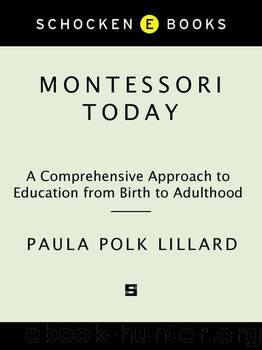Montessori Today by Paula Polk Lillard

Author:Paula Polk Lillard [Lillard, Paula Polk]
Language: eng
Format: epub
ISBN: 9780307761323
Publisher: Knopf Doubleday Publishing Group
Published: 2011-09-07T05:00:00+00:00
Adults understand the concept of uninterrupted time periods with regard to their own activity. We can miss its importance for children’s endeavors. Sometimes parents pressure Montessori schools to hire additional teachers to introduce various special activities into the classroom. These activities are often beneficial to children in and of themselves. However, their benefits are negated by their constant interruption of the children’s work. The protection of the children’s right not to be interrupted when productively occupied is key to the children’s development of concentration and interest in their work.
To prepare teachers for the challenging role which she outlined for them, Montessori devised a thorough training course. Today, it is usually given as a nine-month graduate course after the teacher candidate has completed a bachelor of arts or sciences degree from a qualified college or university. Because the successive planes of development are the basis of Montessori education, it is important to have an understanding of the primary level and the child’s development from birth to age six before studying the elementary level. Teacher candidates who do not hold a Montessori primary diploma are required to take a preliminary course summarizing Montessori theory for the primary child before beginning the elementary course.
The elementary training requires a solid foundation in the sciences, liberal arts and humanities, and covers all major subject areas. The aim is not for the teacher to become an expert in every field of study; rather, the goal is to become a “Renaissance person,” sufficiently knowledgeable to arouse the children’s interest in each area and to direct them to available sources for the answers to their questions.
The Great Lessons, Key Lessons, and materials to be presented to the children are covered in detail during the nine months of the course. An additional bonus for the teacher candidates is that many subjects encountered earlier in their education are often now understood on a deeper level. This is the result of experiencing many concepts on a concrete level for the first time. This is particularly true of mathematical ideas and formulas, which are customarily introduced to students in regular schooling through abstract representations.
In addition to working directly with the key materials, teachers-in-training, in effect, write their own textbooks, referred to in Montessori training as “albums.” These albums are based on lectures and followed by practice with the Montessori materials. By creating their own “textbooks,” teacher candidates develop a deeper understanding of the key materials. They also make the time lines, charts, nomenclature booklets, and many other handmade materials for use in their future classrooms. This hands-on experience leads to a more complete understanding for the teacher candidate.
Final written and oral examinations are given by specified International Teacher Trainers. Each trainee’s album is inspected by a committee of both national and international trainers. The rigorous intellectual challenge of the elementary training course attracts young men and women who are sincerely dedicated to the education of elementary children.
In addition to the intellectual demands of the Montessori elementary course, teacher candidates are challenged in the area of personal development.
Download
This site does not store any files on its server. We only index and link to content provided by other sites. Please contact the content providers to delete copyright contents if any and email us, we'll remove relevant links or contents immediately.
| Administration | Assessment |
| Educational Psychology | Experimental Methods |
| History | Language Experience Approach |
| Philosophy & Social Aspects | Reform & Policy |
| Research |
The Art of Coaching Workbook by Elena Aguilar(51199)
Trainspotting by Irvine Welsh(21668)
Twilight of the Idols With the Antichrist and Ecce Homo by Friedrich Nietzsche(18635)
Fangirl by Rainbow Rowell(9252)
Periodization Training for Sports by Tudor Bompa(8273)
Change Your Questions, Change Your Life by Marilee Adams(7783)
This Is How You Lose Her by Junot Diaz(6887)
Asking the Right Questions: A Guide to Critical Thinking by M. Neil Browne & Stuart M. Keeley(5775)
Grit by Angela Duckworth(5615)
Red Sparrow by Jason Matthews(5475)
Paper Towns by Green John(5191)
Room 212 by Kate Stewart(5123)
Ken Follett - World without end by Ken Follett(4734)
Housekeeping by Marilynne Robinson(4449)
The Sports Rules Book by Human Kinetics(4388)
Papillon (English) by Henri Charrière(4274)
Double Down (Diary of a Wimpy Kid Book 11) by Jeff Kinney(4273)
The Motorcycle Diaries by Ernesto Che Guevara(4102)
Exercise Technique Manual for Resistance Training by National Strength & Conditioning Association(4071)
